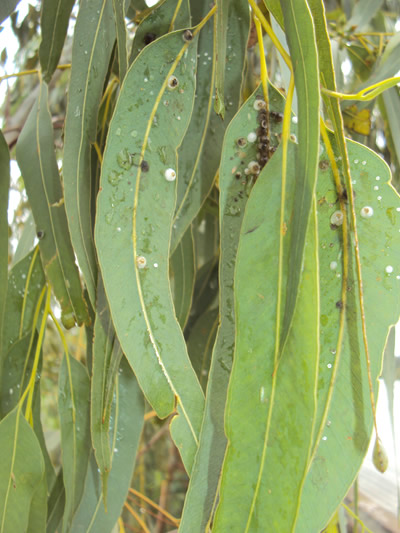Exotic Tree Species under Pests Attack in Malawi

The future of man-made forests in Malawi looks grim as devastating pests have been attacking exotic trees for over three years now. Millions of exotic tree species like eucalyptus, which is popularly known as blue gum in Malawi, have been under attack from a pest known as lerp psyllid, which is making trees lose their leaves and eventually dry up after some weeks. The pest, that makes affected trees drop honey dew, is reported to have originated from Australia.
Malawi has already been losing forest cover at an alarming rate in Southern Africa and the continued devastation of the pest on eucalyptus trees is just exacerbating the situation. The pest was first noticed in Zomba, the city on the south eastern side of the country in 2015 by the forestry department, since then, lerp psyllid has gone on to affect almost all eucalyptus trees in Malawi with the southern province of the country being the worst affected, as it is where there the most man-made forests on mountains are found.
According to recent statistics, Malawi has over 55,000 hectares of eucalyptus tree plantations. This figure leaves out individual trees planted by local people in their villages, crop fields and hills. All these plantations have been affected by the pest.

The individual local owners have been affected too. Whitehead Amos is a farmer in a rural area of Blantyre, and he says that he has lost several trees to this devastating pest, which has attacked all trees in his half acre woodlot.
Another local farmer who has been affected is Magdalena Kuluwira, who has a one acre of eucalyptus woodlot. She says the pest attacked most of her trees but not many have dried up as of now. She thinks her trees have survived due to the periodic pruning she does on her woodlot.
“I have been affected, yes, in a way that all of my trees were attacked, however, only three trees have dried up so far. Perhaps it may be the periodic pruning I do on trees in my woodlot that has done the magic.” She thinks.

I asked a forestry officer working with Malawi government, Glory Kalawo on what is being done to combat the pest attack, but she said up to now researchers have not been able to come up with any solutions to date.
“Our researchers have been working on finding ways to deal with the pests, but up to now they have not been able to find any. Hopefully soon they will succeed and if it happens, we will let people know. Meanwhile, we are just encouraging people to plant new trees to replace the affected ones.” She said.

If not controlled, Malawi could lose most of its exotic forests that provide the country’s population with fuel wood for kitchen use, poles for electricity transmission, culling tobacco and roofing poles. Eucalyptus makes half of the entire exotic forest in Malawi, the other being pine, acacias, gmelina and others. This tree is popular with most households as a fuel wood as it dries up quickly, and therefore is ready to be used when needed. People also like it due to its ability to regenerate into several branches after being cut down which ensures their future availability when needed.

It should also be noted that almost 99 percent of Malawi’s population use baked soil bricks to build their houses, and the bricks are burnt with considerable amount of tree logs much of them exotic. Therefore, losing the entire or significant number of exotic trees will in turn put pressure on the indigenous trees to meet the daily needs of people, which could spell doom for the nation.
This is a guest post written by Deogracias Benjamin Kalima.

Deogracias Benjamin Kalima is a Malawian journalist based in Blantyre. He mostly report on environment conservation, agriculture, and rural development. His work has appeared in German (journafrica.de), American (earthisland.org) and African (ruralreporters.com) online platforms.

